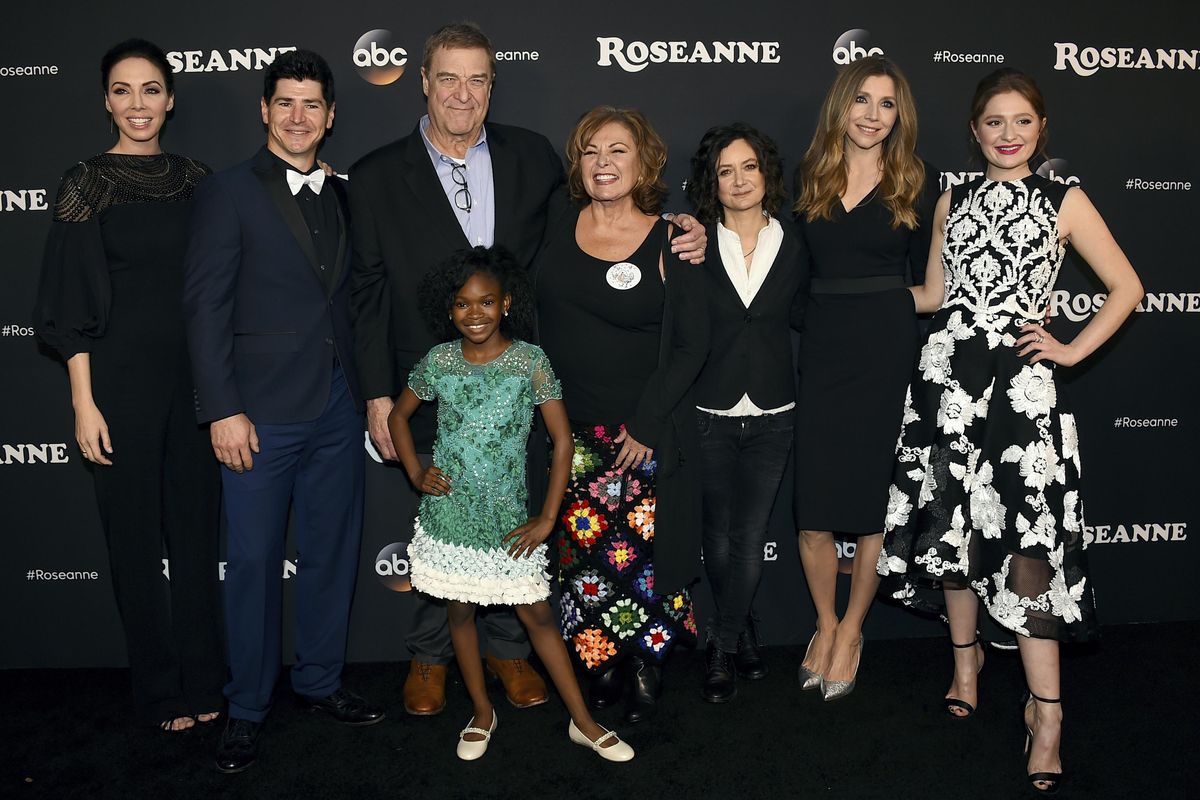The five kinds of reactions to the ‘Roseanne’ reboot, across the political spectrum

Roseanne Barr’s politics have historically been tough to pinpoint.
The actress claimed in a since-deleted tweet from December that journalists used to call her a liberal “back in the day,” probably during the original “Roseanne” run. (She often exhibited socially liberal qualities in real life and on screen.) Then, in 2012, Barr sought the Green Party nomination for the presidency. She has recently opted to circulate conspiracy theories of the pro-Trump Internet.
Given this last development, ABC’s revival of the ’90s sitcom was destined to get people talking. An audience of 18.4 million watched the one-hour premiere Tuesday night, which led to a deluge of tweets and think pieces and a congratulatory call to Barr from the president himself.
Those reactions, like Barr’s politics, have been all over the place. Biting criticism appears online between supportive messages, neither of which necessarily corresponds with political views.
To help guide your decision as to whether to watch (or keep watching) “Roseanne,” here are five different themes the responses display.
1. Wholehearted approval of the sitcom and its star
Barr is vocal about her support for the president, and so is her on-screen counterpart. In the show, Roseanne argues with her liberal sister, Jackie (Laurie Metcalf, sporting a “Nasty Woman” T-shirt), about their differing politics. She claims Trump “talked about jobs, Jackie, he said to shake things up” and tosses in a dig at “Fake News.”
It makes sense that members of the Trump administration and family would approve of the reboot. Dan Scavino Jr., the White House’s director of social media, congratulated the cast on his personal Twitter account. Donald Trump Jr. praised Barr and suggested she pursue a late-night TV show, too: “Seems there’s some demand for an alternate viewpoint.” British journalist Piers Morgan took a firm stance, telling “screaming Trump-hating liberals” that the show’s ratings meant “not everyone in America thinks like you.”
2. Cautious support for the depiction of familial struggles
Variety TV critic Sonia Saraiya praised “Roseanne” for confronting “the same harsh realities” as the original show did more than two decades ago. The Conners have long been seen as one of the most accurate depictions of working-class America on television, and the series premiere continued the tradition, Saraiya said. Darlene (Sara Gilbert) has moved back in with her parents, Roseanne and Dan (John Goodman), after she loses her job. And those two struggle with the high costs of their prescription medication.
Comedian Sarah Silverman tweeted that she “loved” the reboot because of how it portrayed the turmoil many families have experienced since Trump was elected president: “That familiar feeling of the old but w comedy & content so totally of this moment like the angst w/in close families over politics. Hope y’all let go of needing art 2 reflect/express only what u yourself feel. That’s not what art’s 4.”
3. Criticism of how the show inaccurately represents Trump voters
Jared Yates Sexton, a seemingly liberal Georgia Southern University professor, tweeted that the reboot presents an “idealized version” of the president’s base. While the original show provided an honest, “warts and all look” at Middle America, he added, the current show glazes over the fact that Roseanne is turning “a blind eye to Trump’s many, many bigoted statements.”
Conservative radio host Ben Shapiro, on the other hand, said the show fails to represent Trump voters because it “recasts Trump voters as social Leftists who just disagree about economics.” Like Sexton, he used the word “fantasy” to describe the depiction and claimed that it presented the voters as “people who agree with Hollywood elites on values, but just disagree on economics because they’re old white factory workers.”
4. Disapproval of how the sitcom treats politics
Linda Holmes, host of NPR’s “Pop Culture Happy Hour,” engaged with Saraiya in an online conversation about how the premiere treated politics itself. The resolution for Jackie and Roseanne fighting was for them to realize that their differing political views did not matter, Holmes argued, and that is a dangerous conclusion.
“It treats politics like a separable, irrelevant disagreement that doesn’t actually have any consequences,” she tweeted, adding, “It basically treats politics as an emotional issue for white people, something that they need to work out with each other, but not as something that makes anyone’s lives better or worse.”
5. Realization that “Roseanne” might not be worth watching at all
Writer-actor Kumail Nanjiani countered Silverman’s positive sentiment in a reply to her tweet, referring to Barr’s controversial statement about a Parkland, Florida, survivor. (Though the post has been deleted, she reportedly claimed teen activist David Hogg was giving a Nazi salute when in reality he was raising his fist.)
“I believe who can bring themselves to watch what art is a subjective thing,” Nanjiani wrote. “I can’t bring myself to watch a person who mocks teens whose friends were murdered, who traffics in conspiracy theories that damage our world & reality.”
Comedian Billy Eichner expressed his support of Nanjiani’s words, adding that there are “plenty of other shows to watch now.”
In a piece for the New York Times, writer Roxane Gay recognized that the “Roseanne” premiere was, in fact, funny. But she will not be watching further.
“This fictional family, and the show’s very real creator, are further normalizing Trump and his warped, harmful political ideologies,” Gay wrote. “There are times when we can consume problematic pop culture, but this is not one of those times.”